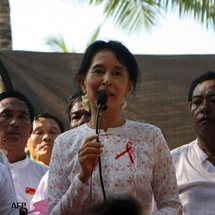
"The Burmese are as excited by these events as peoples elsewhere," she said, according to an official transcript.
"Do we envy the people of Tunisia and Egypt? Yes, we do envy them their quick and peaceful transitions. But more than envy is a sense of solidarity and of renewed commitment to our cause, which is the cause of all women and men who value human dignity and freedom," Suu Kyi added.
The address was pre-recorded in Myanmar and formed part of the 2011 Reith Lectures, a major annual event in the BBC calendar which honours the first head of the broadcaster, John Reith.
A second lecture by Suu Kyi, who was married to British academic Michael Aris, who died in 1999, and studied at Britain's prestigious Oxford University, will be broadcast on Tuesday next week.
Pro-democracy protests in 1988 and 2007 were brutally crushed by the military rulers of Myanmar, also known as Burma.
Suu Kyi was freed in November after seven straight years of house arrest, less than a week after an election that critics said was a charade aimed at preserving military rule behind a civilian facade in Myanmar.
In her lecture, Suu Kyi drew extensive parallels between the Arab Spring and uprisings in Myanmar, saying the revolution that toppled Tunisian president Zine el Abidine Ben Ali in January was particularly similar to Myanmar in 1988.
"In Tunis and in Burma, the deaths of two young men were the mirrors that made the people see how unbearable were the burdens of injustice and oppression they had to endure," he said.
She also cited the role of rappers in the Tunisian revolt, saying that young rap artists were playing a similar role in Myanmar, with some of them jailed after the monk-led "Saffron Revolution" in 2007.
But Suu Kyi said there was an important difference in that a "communications revolution" had helped the Arab uprisings, while in Myanmar it had been more difficult to get information out.
"Not just every single death, but even every single wounded can be made known to the world within minutes. In Libya, in Syria, and in Yemen now, the revolutionaries keep the world informed of the atrocities of those in power," she said.
Suu Kyi has previously said she wants to launch her first political tour of the country since her release, although a schedule has not yet been announced.
Security is a top concern for the party as Suu Kyi's convoy was attacked in 2003 in an ambush apparently organised by a regime frightened by her popularity.
The opposition leader, who turned 66 this month, has won international acclaim for her peaceful resistance in the face of oppression.
In 1990 she led her National League for Democracy party to a landslide election win that was never recognised by Myanmar's military rulers. She boycotted last year's vote, saying the rules were unfair.
------------------------------------------------------------------------------------
"Do we envy the people of Tunisia and Egypt? Yes, we do envy them their quick and peaceful transitions. But more than envy is a sense of solidarity and of renewed commitment to our cause, which is the cause of all women and men who value human dignity and freedom," Suu Kyi added.
The address was pre-recorded in Myanmar and formed part of the 2011 Reith Lectures, a major annual event in the BBC calendar which honours the first head of the broadcaster, John Reith.
A second lecture by Suu Kyi, who was married to British academic Michael Aris, who died in 1999, and studied at Britain's prestigious Oxford University, will be broadcast on Tuesday next week.
Pro-democracy protests in 1988 and 2007 were brutally crushed by the military rulers of Myanmar, also known as Burma.
Suu Kyi was freed in November after seven straight years of house arrest, less than a week after an election that critics said was a charade aimed at preserving military rule behind a civilian facade in Myanmar.
In her lecture, Suu Kyi drew extensive parallels between the Arab Spring and uprisings in Myanmar, saying the revolution that toppled Tunisian president Zine el Abidine Ben Ali in January was particularly similar to Myanmar in 1988.
"In Tunis and in Burma, the deaths of two young men were the mirrors that made the people see how unbearable were the burdens of injustice and oppression they had to endure," he said.
She also cited the role of rappers in the Tunisian revolt, saying that young rap artists were playing a similar role in Myanmar, with some of them jailed after the monk-led "Saffron Revolution" in 2007.
But Suu Kyi said there was an important difference in that a "communications revolution" had helped the Arab uprisings, while in Myanmar it had been more difficult to get information out.
"Not just every single death, but even every single wounded can be made known to the world within minutes. In Libya, in Syria, and in Yemen now, the revolutionaries keep the world informed of the atrocities of those in power," she said.
Suu Kyi has previously said she wants to launch her first political tour of the country since her release, although a schedule has not yet been announced.
Security is a top concern for the party as Suu Kyi's convoy was attacked in 2003 in an ambush apparently organised by a regime frightened by her popularity.
The opposition leader, who turned 66 this month, has won international acclaim for her peaceful resistance in the face of oppression.
In 1990 she led her National League for Democracy party to a landslide election win that was never recognised by Myanmar's military rulers. She boycotted last year's vote, saying the rules were unfair.
------------------------------------------------------------------------------------









 Home
Home Politics
Politics









